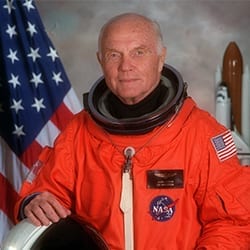George Abbey, the institute’s senior fellow in space policy and the former director of the Johnson Space Center, reflects on the life and legacy of John Glenn, who died Thursday at age 95.
I first met John Glenn in March 1959. John, Alan Shepard and several other Mercury astronaut candidates had come to Dayton, Ohio, for mental and physical environmental tests at the Wright Air Development Center. I was attending graduate school at Wright Field at the time and one of my classmates had a friend in the group. They were all staying at the bachelor office quarters and so my friend and I went over to visit with them. They were all enthusiastic and looking forward to their upcoming tests and their hopeful selection as the nation’s first astronauts.
John Glenn already had an outstanding resume. He had flown 59 combat missions in the Pacific in the F-4U Corsair during World War II and over 100 combat missions in Korea, shooting down three MiGs. He was a graduate of the Navy Test Pilot School and had set a transcontinental speed record from Los Angeles to New York — three hours and 23 minutes in an F8U Crusader. It was the first transcontinental flight at average supersonic speed.
Of the group members I met, two made a lasting impression on me: John Glenn and Alan Shepard. I would come to know them both much better in future years as good friends and co-workers.
In 1961, some two years after that first meeting with Glenn, Yuri Gagarin became the first human to orbit the Earth. And three weeks after Gagarin’s flight, Alan Shepard became the first American to fly in space on a sub-orbital flight. It was only a little more than two weeks after Alan Shepard flew when President John F. Kennedy announced the United States was going to land astronauts on the moon and safely return them back to earth.
John Glenn became the first American to orbit the earth eight months later in February 1962. John’s successful flight contributed significantly to restoring the nation’s confidence in America’s technology and its leadership, and led the way for the six successful Apollo landings on the moon that would come.
And yet John Glenn’s contribution to the nation and the world had only just begun. He went on to serve in the U.S. Senate for more than 24 years, and at age 77 once again orbited the Earth, flying on board Space Shuttle Discovery on a nine-day mission in 1998.
John was truly a great American hero with a lifetime of service and devotion to his nation and his fellow man. He was clearly one of the “Greatest Generation.” The country and I will miss John Glenn. In the absence of new heroes who can equal the devotion and commitment of that shown by John Herschel Glenn from Cambridge, Ohio, whom we all came to respect and admire, future generations of Americans will miss him even more.
